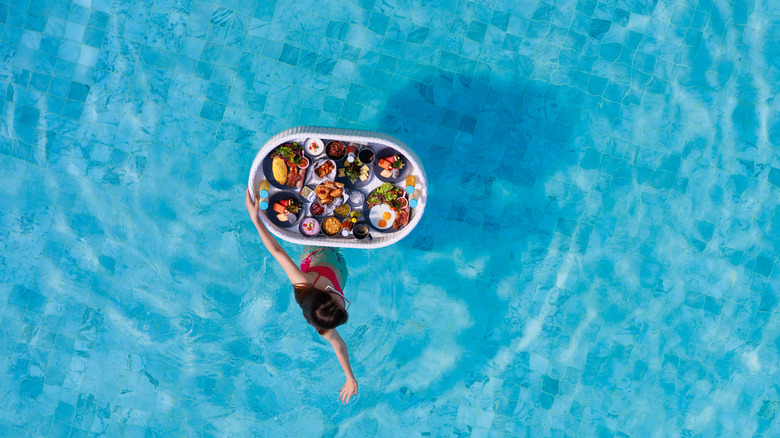What Is Floating Breakfast, And Is It Actually Safe To Try?
Gazing out over the ripples of an infinity pool, you bite into a soft croissant and debate whether to take a sip of champagne or coffee. No, you're not dining poolside; this is a floating breakfast, and you're donning a swimsuit. This indulgent breakfast-service takes pampering to a new level, cramming deliciously classic items onto an ultra buoyant wicker tray. The practice predominantly rocketed to fame thanks to Bali influencers. At first glance, the precarious yet pretty meal is safe to try. But is it truly one of the best breakfast hacks to start your day off right?
Safety often boils down to water quality; even the cleanest pools have chemicals that make them unsuitable for drinking in moderate-to-large amounts. And between 2015 and 2019, the CDC found hotels to account for 34% of swimming pool and hot tub-related illness outbreaks. A miscalculated splash and diners could be getting more than the fruit bowl they bargained for.
That's without accounting for spillages and crumbs; is a week-old chunk of toast from a previous guest enough to churn your stomach? Between analyzing the risk of contamination from previous breakfasters and dodging any airborne threats like birds, a concerning picture quickly takes form. Don't get us started on the practical difficulties, either, dragging the tray to a step so you can properly grab your food. The key takeaway here is to be wary where you try a floating breakfast — not everywhere lives up to the aesthetic.
Green flags when booking a floating breakfast
We all know why hotel breakfasts are the best; they feel indulgent and easy. Of course, this is especially the case with an aesthetic floating spread. But just like there are best and worst hotel breakfast foods, there are some green (and red) flags to memorize when booking a pool-based experience. Number one is to always abide by the temperature rule — whether an item is meant to be hot or cold, ensure it's fresh and ticking the right box. Lukewarm eggs or tepid fruit juice could be a cause for concern. And, unfortunately, floating breakfasts are particularly vulnerable to temperature control issues. Since the trend is popular in destinations around Asia and the Pacific, the trays are often exposed to warm weather that can render just two hours sufficient time to grow bacteria.
Similarly, to limit contamination from previous guests, it's worth prioritizing these in-water-dining experiences at hotels that offer private plunge pools. With less guest traffic than the main pool, these likely have a lower bacteria risk, although specific cleaning regulations will vary country-by-country. And, as some final food for thought, don't turn your nose up at more traditional restaurant screening methods, too. Scan the reviews online and check the social media comments. Gauge both the quality of the floating experience and the overall food hygiene of a venue before booking. You can never be too careful.

